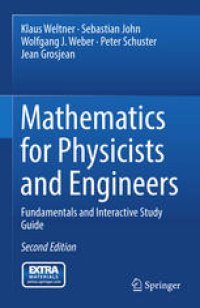
Ebook: Mathematics for Physicists and Engineers: Fundamentals and Interactive Study Guide
- Genre: Physics
- Tags: Mathematical Methods in Physics, Appl.Mathematics/Computational Methods of Engineering, Mathematical Applications in the Physical Sciences, Theoretical and Computational Chemistry
- Year: 2014
- Publisher: Springer-Verlag Berlin Heidelberg
- Edition: 2
- Language: English
- pdf
This textbook offers an accessible and highly approved approach which is characterized by the combination of the textbook with a detailed study guide available online at our repository extras.springer.com. This study guide divides the whole learning task into small units which the student is very likely to master successfully. Thus he or she is asked to read and study a limited section of the textbook and to return to the study guide afterwards. Working with the study guide his or her learning results are controlled, monitored and deepened by graded questions, exercises, repetitions and finally by problems and applications of the content studied. Since the degree of difficulties is slowly rising the students gain confidence and experience their own progress in mathematical competence thus fostering motivation. Furthermore in case of learning difficulties he or she is given supplementary explanations and in case of individual needs supplementary exercises and applications. So the sequence of the studies is individualized according to the individual performance and needs and can be regarded as full tutorial course. The study guide satisfies two objectives simultaneously: firstly it enables students to make effective use of the textbook and secondly it offers advice on the improvement of study skills. Empirical studies have shown that the student's competence for using written information has improved significantly by using this study guide.
The new edition includes a new chapter on Fourier integrals and Fourier transforms, numerous sections had been updated, 30 new problems with solutions had been added. The interactive study guide has seen a substantial update.
This textbook offers an accessible and highly approved approach which is characterized by the combination of the textbook with a detailed study guide available online at our repository extras.springer.com. This study guide divides the whole learning task into small units which the student is very likely to master successfully. Thus he or she is asked to read and study a limited section of the textbook and to return to the study guide afterwards. Working with the study guide his or her learning results are controlled, monitored and deepened by graded questions, exercises, repetitions and finally by problems and applications of the content studied. Since the degree of difficulties is slowly rising the students gain confidence and experience their own progress in mathematical competence thus fostering motivation. Furthermore in case of learning difficulties he or she is given supplementary explanations and in case of individual needs supplementary exercises and applications. So the sequence of the studies is individualized according to the individual performance and needs and can be regarded as full tutorial course. The study guide satisfies two objectives simultaneously: firstly it enables students to make effective use of the textbook and secondly it offers advice on the improvement of study skills. Empirical studies have shown that the student's competence for using written information has improved significantly by using this study guide.
The new edition includes a new chapter on Fourier integrals and Fourier transforms, numerous sections had been updated, 30 new problems with solutions had been added. The interactive study guide has seen a substantial update.